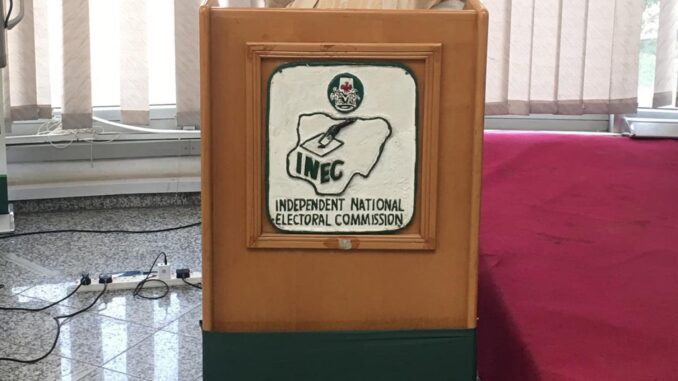
At a time the country is struggling with finances to keep government afloat, when all departments and agencies are charged to exercise utmost prudence, that sum of N89 billion demanded by the Independent National Electoral Commission (INEC), as appropriation for statutory obligations in 2024 appears outrageous. Having just come out of a costly and less accountable 2023 elections, the commission and other agencies and departments of government that are in the habit of demanding big budgets, should scale down significantly on aspects of their activities that are avoidable, wasteful and unproductive.
It is true that democracy is about the most widely accepted ways of governance; and election is the kernel of democracy. But where conduct of elections cannot be accommodated within reasonable financial confine of a country, democracy is doomed, along with good governance. The INEC therefore has a duty to not only conduct free and credible elections in the country, but to also do so without pushing the country to financial and economic adversity.
At the defence of the commission’s budget in December, INEC chairman, Prof. Mahmood Yakubu said the commission would be needing more than the original N40 billion allotted to meet statutory obligations in 2024. It demanded N89 billion. The commission expressed surprise that it was given less than the N68 billion it got for statutory expenditure in 2024.
A breakdown of the proposed spending include: personnel cost of N44.5 billion, up from N26.5 billion in 2023; overhead cost N7.9 billion and electoral expenditure of N9.7 billion as well as a capital expenditure of N909 million. Yakubu said the commission has 15,000 staff spread across the country, in 36 states, 774 councils as well as the Federal Capital Territory.
Without doubt, the activities of the commission are felt in the nooks and crannies of the country. However, general elections are not conducted yearly, apart from the one or two off-cycle elections in a few states. For instance, governorship elections will take place in Ondo and Edo states in 2024. Earlier in 2023, after the general elections, governorship elections were held in Bayelsa, Kogi and Imo states. Also, the commission has announced rerun elections in nine states in February 2024 as ordered by the courts.
Notwithstanding, these cannot justify humongous yearly budgets for a commission whose activities are designed by the Constitution of the Federal Republic (1999) and the Electoral Act 2022 to take place once in four years. The aberration that results in staggered elections calls for reform of the electoral system. For instance, the Electoral Act should be updated to ensure that electoral cases in tribunals are dispensed with before inauguration of winners. Much has been said about how that will stop election cases from spilling off-cycle and creating extra costs and logistics problems for INEC and the country.
After the major general elections of last year, it is incumbent on INEC to thoroughly explain how the capital budget was dispensed. Nigerians deserve to know how much INEC got for that outing and how it was utilised, to enable taxpayers keep track of the activities of the commission. It is not enough to sidestep capital expenses while focusing on just statutory allocation. Nigeria is not under a fascist government where only insider operators know what is going on. INEC should be transparent and made to account for every dime it spent in 2023. INEC’s N105.25 billion budget for the Bimodal Voter Accreditation System (BVAS) is reported to allegedly surpass market cost by 30.4 per cent. The commission should clear the air on its contracts. Even military budgets must carry taxpayers along.
The commission did not convincingly explain how its proposed personnel cost for 2024, N44.5 billion suddenly jumped from the N26.5 billion it got in 2023. Taxpayers deserve to know the details. And the respective appropriation committees in the National Assembly should dig deeper in their probing.
Moreover, in this digital age, INEC should not disregard calls for it to transition fully from manual efforts to less paperwork, a move that can cut down on excess bureaucracy and redundancy. We are aware that several staff in far-flung state offices do not have much to do after elections. Offices that do not render a full complement of service during off-peak seasons should not be allowed to incur unnecessary expenses.
Registration of voters, which is made to look arduous and costly, can be done with more of citizens’ participation via online platforms and less of physical contacts, which is even unsafe for both ad hoc and full staff of the commission. Many were injured in the last exercise.
The electoral umpire should encourage volunteering by citizens and groups that are available to support its works. Elsewhere, elections are not contrived to be so tedious and militaristic. Let all Nigerians be interested and reduce the pressure on INEC. It is true that Nigeria is struggling to construct a uniform national database of citizens, but there are existing data at different agencies from which INEC could tap to harvest those eligible for the next elections. Nigeria is trending towards inability to sustain democratic governance and this is the time to stop waste. The Independent National Electoral Commission has an onerous duty to the country to sustain democracy in all its ramifications.
If INEC has not been a fantastic success, it is not for lack of money. Other countries do far better with less resources. They conduct elections for Diaspora citizens and spend less time on elections. Sadly, Nigerians waste a whole year on elections and an endless time sorting unimaginable electoral distortions at the tribunals. On elections, Nigeria is a huge joke; and INEC must accept responsibility in part, for this lapse. Let the INEC bureaucracy be tight, trim and competent; to set a worthy example for Africa and the world.
END

Be the first to comment